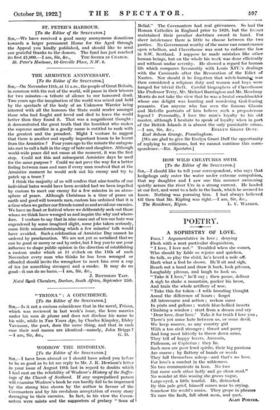THE ARMISTICE ANNIVERSARY.
[To the Editor of the SPECTATOR.]
SIR,—On November 11th, at 11 a.m., the people of Great Britain, in common with the rest of the world, will pause in their labours for two minutes—a tribute of silence to our honoured dead. - Two years ago the imagination of the world was seized and held by the spectacle of the body of an Unknown Warrior being interred with all the honours the State could render amongst those who had fought and loved and died to leave the world better than they found it. That was a magnificent thought : it demonstrated the great truth that the humblest who makes the supreme sacrifice in a goodly cause is entitled to rank with the greatest and the proudest. Might I venture to suggest that there is another and equally important lesson to be learnt from the Armistice ? Four years ago to the minute the antagon- ists met to call a halt in the orgy of hate and slaughter. Although world-wide peace did not ensue at the moment, it was the first step. Could not this and subsequent Armistice days be used for the same purpose ? Could we not pave the way for a better feeling between man and man if every man resolved that at the Armistice moment he would seek out his enemy and try to patch up a truce ?
I think the majority of us will confess that nine-tenths of our individual hates would have been avoided had we been impelled by custom to meet our enemy for a few minutes in an atmo- sphere of peace. Although Christmas is a time of peace on earth and good will towards men, custom has ordained that it is a time when we gather our friends round us and avoid our enemies. We have no feast or festival where we deliberately seek out those whom we think have wronged us and inquire the why and where- fore. I venture to say that in nine cases out of ten our hate was engendered by some imagined slight, some joke taken seriously, some little misunderstanding which a few minutes' talk would have avoided. Such a celebration of Armistice Day cannot be ordered by proclamation. We are not yet so socialized that we can be good or merry or sad by order, but I beg you to use your . influence to shape public opinion in the direction of establishing a custom under which at 11 o'clock on the 11th of each November every man who thinks he has been wronged or offended should invite the wrongdoer to meet him over a cup of tea (or something stronger) and a smoke. It may do no good—it can do no harm.—I am, Sir, &c.,










































 Previous page
Previous page